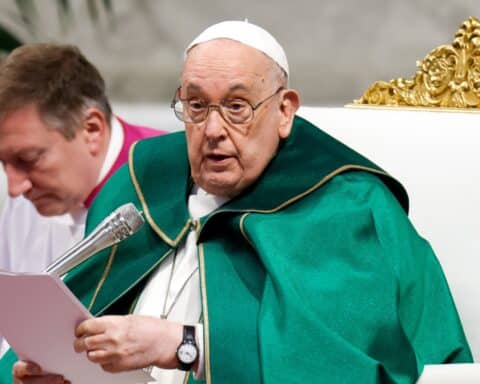
— Name withheld, Los Angeles
Answer: The King James Version of the Bible was never a “standard” for the Catholic Church. It was commissioned in 1604 and published in 1611 for the Church of England, by sponsorship of King James VI. The books of the current King James Version include 39 books of the Old Testament and the 27 books of the New Testament. The original King James included the books of the ancient and Catholic Old Testament: Tobit, Judith, Wisdom, Ecclesiasticus (Sirach), Baruch, and First and Second Maccabees. By 1769, however, the King James Version had dropped these seven Old Testament books and conformed itself to the shorter Protestant canon (or list) of Old Testament. Hence, for Catholics, the King James Bible is incomplete, lacking these books that were in the Septuagint (the Greek Old Testament). These had been read by Christians since the apostolic era and for more than 1,500 years until Martin Luther eliminated them.
It is impossible to deny the lofty beauty of the King James Bible. It is an English masterpiece worthy of Shakespeare. It was written in an intentionally majestic style to emphasize the sacredness of the biblical text. And while it can certainly edify, there are times when it can be more difficult to understand. For example, when Pilate handed Jesus over, the King James renders it: “Then delivered he him therefore unto them to be crucified. And they took Jesus, and led him away” (Jn 19:16). Gorgeous English to be sure, but the phrase “he him therefore unto them” can vex the inexperienced reader or speaker of the text. Or, for another example, in the resurrection appearance of the first Easter evening: “And when he had thus spoken, he shewed them his hands and his feet. And while they yet believed not for joy, and wondered, he said unto them, Have ye here any meat?” (Lk 24:40-41). Again beautiful, but “while yet they believed not for joy and wondered” is complex.
For Catholics, the “standard” translation was once the Douay Rheims Bible. It is actually an older English translation than the King James. The Douay Rheims was published in 1582. Its language is in an older style but less lofty. As such, it is more understandable to modern readers. It also has the Old Testament books that are missing in the King James. For more traditional Catholics, the Douay Rheims is favored due to its time-tested quality and its use in scriptural translations of the old missal.
For Catholics in general today, the most commonly used translations are the Revised New American Bible (RNAB), the Revised Standard Version (Catholic edition) (RSVCE), and the Jerusalem Bible (JB). The RNAB emphasizes readability and, because it is used for the lectionary at Mass, it is recognizable. The RSVCE is more accurate in its translation and more scholarly. The JB is also very readable and has good footnotes and cross-links. Further, all of these newer translations take advantage of the most recent Biblical discoveries. Many ancient manuscripts have been discovered since the 16th century that have helped to clarify textual puzzles in the ancient Hebrew and Greek manuscripts.
Since you want to both read and study the Bible, the RSVCE is probably best. There are also good study Bibles, such as the Didache Bible or the Ignatian Study Bible. Father Mike Schmitz also has a good podcast called “The Bible in a Year.”
Charity vs. tolerance
Question: What is the difference between Christian charity and secular tolerance? It seems charity addresses immorality with love and tolerance avoids judging at all costs.
— Art Osten, Jr., Fox River Grove, Illinois
Answer: Tolerance is widely misunderstood today to mean, “I approve of what you are doing.” However, tolerance actually presupposes that we do not approve of the actions of another. Tolerance is exhibited and needed when, for the sake of some other matter (maintaining civility, collaborating in a shared cause, exhibiting patience or waiting for a better time), we do not insist on correcting what is irksome or wrong in every case, right away. Tolerance is an aspect of charity, but so is rebuke. Prudence must determine where and when we insist on correction and when we must tolerate something that we do not approve of.
Msgr. Charles Pope is the pastor of Holy Comforter-St. Cyprian in Washington, D.C., and writes for the Archdiocese of Washington, D.C. at blog.adw.org. Send questions to msgrpope@osv.com.





